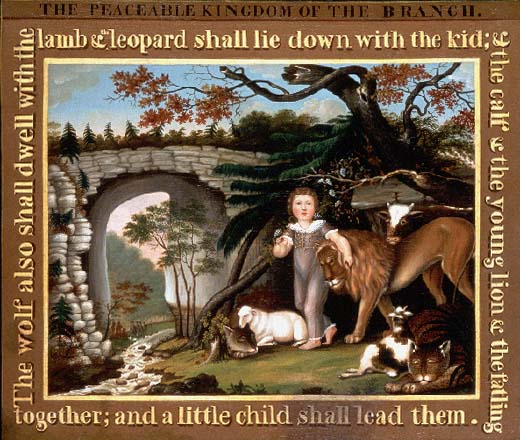Editorial: Peace Be with You

Edward Hicks painting, c. 1823, from the Peaceable Kingdom series; courtesy Abby Aldrich Rockefeller Folk Art Museum.
Peace has been for centuries a universal greeting and sign. We may recall that the World War II military victory V-sign was transformed in the 1960s into a peace symbol; signs of the times. Peace was always more than a simple hello; it was a bestowal of peace on someone, a blessing. In the Middle East, for example, that area of the world so riven by violence, it is perhaps not so strange an irony that a common greeting is (in Hebrew) shalom aleikhem (Peace be with you), and the reply aleikhem shalom (Peace also be with you). In Arabic it is as-sal alaykum (Peace be with you), common to Muslims in Turkey, Indonesia, Central Asia, Iran, India, et al. The response is as-salamu alaykum, and can also be translated as “Peace also be with you”.
In an uncertain world, when people greet each other with the word “peace”, the greeting is a wish for how things might be, if they are not. It speaks to our deep need to live in peace, free from conflict, to live out our days not tormented by betrayals or ruptures, between loved ones, between neighbors, or by our body politic. Peace can mean, “may things not disturb you” or, “may you live free from painful conflicts.” The greeting speaks to a fear, that the world, or reality, is not at all peaceful and may never be so; that conflict, war, terrorism and every expression of violence might encroach on our personal lives. “Peace be with you” is the wish that the other be spared, that we may also be spared.
The word peace might conjure up passive images or absences, but its root meaning is a far cry from passivity. The Arabic root, salaam, besides meaning peace can also mean friendliness, prosperity, well being, and good health, all of which make perfect sense if you think of what you most want for yourself, your family and friends, and might summarize in one word.
The English language root is no less active; it derives from the Anglo-French pes meaning reconciliation and agreement, which peace surely is. The Latin pax meant not only peace but also a peace treaty or pact. It was a state achieved through negotiation and effort, not a given static state but an end accomplished through diligent effort. It takes a lot of energy and skill to resolve a conflict, to achieve peace, and so the greeting always has and always will express a consortium of hopes for our lives and the lives of others. We are at our best when we would bestow peace.
There is an oddity about the word peace that sets it apart from other words; it signifies as much a greeting as a farewell, an arrival and a departure, as if it would circumscribe and bracket our days and lives. The Christian churches acknowledge the value of such a farewell. In the Roman Catholic Mass, for example, there is the Sign of Peace, and at the end the priest raises his hand in blessing and says, “Go in peace.”
But the concept and experience of peace is ubiquitous to East and West. In India it is shanti, which means a state of inner tranquility and sometimes a state of enlightenment, or of achieving and being enlightened. One Buddhist text says that, “Peace of mind comes from having successfully transcended greed, hatred and ignorance.” And in Buddhism the framework and foundation of peace is our interdependence with all living things, peace as an expression of interrelationship, which challenges us to see our greater responsibility towards others, the stranger in our midst and abroad, and towards all living things. It is an acknowledgment that our best interests are served, in the best meaning of the term, through achieving peace.
It is not so surprising that sentiments of peace wind their way through so much of the world’s sacred scripture. In the Old Testament (Psalm 85:2) there is the beautiful line that “righteousness and peace do each other kiss,” and in Isaiah (2:4) there are these famous lines that have inspired hymns, popular songs, and the Ploughshares peace movement:
They will beat their swords into plowshares
and their spears into pruning hooks.
Nation will not take up sword against nation,
nor will they train for war anymore.
Hindu scripture is also rich with evocations of peace, as in the extract below from the c. 2500 year-old Atharvaveda, which would extend peace as a kind of comforting cosmic blanket over all, in contradiction of those destructive forces that would beset and torment us, a blessing and wish that we here would make for all of you, your family, and friends.
Peace be on earth,
Peace be in the skies,
Peace be in heaven,
Peace be in the waters,
Peace be upon plants,
Peace be upon trees;
Peace be on all living things;
May God grant me peace;
May peace prevail through these words.
Peace!
EDITOR’S NOTE: Joseph Geraci is our Editor, and Director of the Satyagraha Foundation. You may access his Author’s page via the Author Archives link at the top of the page.




